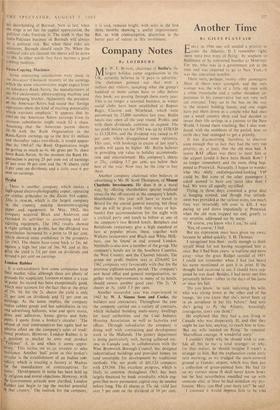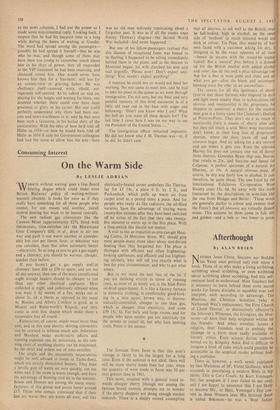Another Time
By GILES PLAY FAIR
EARLY in 1946 one still needed a priority to cross the Atlantic. If I remember right, there were two ways of flying: by seaplane to Baltimore or by converted bomber to Montreal. For me, who was in •a government job at the time and was .required to go to New York,,' it \vas the converted bomber.'
There were, perhaps, twenty other passengers. Most of them were youngish, and the only woman Ns as the •wife of i little old man with a white moustache and a rather shrunken ap.- pearance in his Conservative but not very well cut overcoat. They sat in the bus on the way to the airport holding hands, and one might have put them down as a couple who had once run a small country 'shop and had decided to invest their life savings in a journey to the New World. I found them touching. But I also 'won- dered, with the snobbism of the period, how on earth they had managed to get a priority.
It was disconcerting, therefore, to discover soon enough that in fact they had the very top priority; or, at least, that the old man had.. A senior RAF officer was there to meet him at the airport (could it have been Heath Row? I no longer remember), and the same thing hap- pened at Prestwick. Naturally, I began to wonder who this oddly undistinguished-looking VIP could be. But none of the other passengers I asked scented to haVe any more idea than I had. We were all equally mystified.
Flying in those days consisted a great deal in hanging around, and though free refresh- ment was provided,at the various stops, too much time was invariably left over to kill. 1 was pacing up and down impatiently at Prestwick when the old man stopped me and, greatly to my surprise, addressed me by name.
Of course, you know who / ant,' he said.
'Yes, of course,' I lied.
But my expression must have given me away, because he added quickly, 'J. H. Thomas.'
I recognised hint then: easily enough to think myself blind for not having recognised hint at once. But it had bcen year* • a wartime and mOre away----since the great Budget scandal of 1935. I could not remember when I had last heard his name mentioned or seen it in print. If the thought had occurred to me, 1 should have sup- posed he was dead. Besides. I had never met. him personally before -either in the da■,s of his tame or since his fall.
'Do you know.' he said. indicating his wife, who was sitting down at the other end of the lounge, 'do you know that she's never been up in an aeroplane in her life before? And now she's going to ..fly the Atlantic. Amazingly courageous, don't you think?'
He explained that they had a son living in Canada who was desperately and that they 'night be too late, anyway, to reach him in time. 'But my wife insisted on flying,' he repeated. 'Marvellous courage. A wonderful story.'
I couldn't think why he should wish to con- fide all this to Me a total stranger—or why, for that matter, he should imagine I wasn't a stranger to him. But the explanation came early next morning, as we trudged the snow-covered ground at Gander airport, which was then just a collection of green-painted huts. He had hit on my correct name (1 shall never know how). but he had nevertheless muddled me up with someone else; at •least he had mistaken my pro- fessiOn. 'Has c You filed your Story yet?' he said.
I assumed it would depress hint to be told to the news columns, I had not the power so I made some noncommittal reply. Looking back, I suspect that he had his happiest time in a long while during the hours of waiting at Gander. The word had spread among the passengers— possibly he had spread it himself—that he was who he was; and though some of them may have been too young to remember much about him in his days of power, they all responded to the VIP treatment he had been receiving, and clustered round him. One would never have known him then for a 'has-been'; still less for an anxiety-torn or grieving father. He was ebullience tself—assured, witty, ribald, out- rageously self-centred. As he talked on and on, playing for the laughs and waiting for them, one doubted whether there could ever have been greatness or glory in his career. But one could perfectly understand why there had been suc- cess and news-worthiness in it; why' he had once been such a favourite, in his boiled shirt, of the caricaturists. With his tales of how he'd told off Hitler in 1934—or how he would have told off 'Hitler in 1934 if only his Government colleagues had had the sense to allow him his way—here was no old man tediously reminiscing about a forgotten past. It was as if all the events since Jimmy Thomas's disgrace—the Second World War included—had never happened.
But one of his fellow-passengers realised that this illusion of recaptured fame was bound to be fleeting. I happened to be sitting immediately behind them in the plane, and as the descent to Montreal began, his wife clutched his arm and said urgently, Please now! Don't expect any- thing! You mustn't expect anything!'
I suppose he could not or would not heed her warning. No one came to meet him, and he had to take his place in the queue as we went through immigration. I'm not sure, but my final and very painful memory of this brief encounter is of a little old man red in the face with anger and bellowing : 'Don't you know who I am? What the hell 'do you want all these details for? The last time I came here I was on my way to see the President of the United States....'
The immigration officer remained impassive. He did not know who J. H. Thomas was—or, if he did, he didn't care.































 Previous page
Previous page